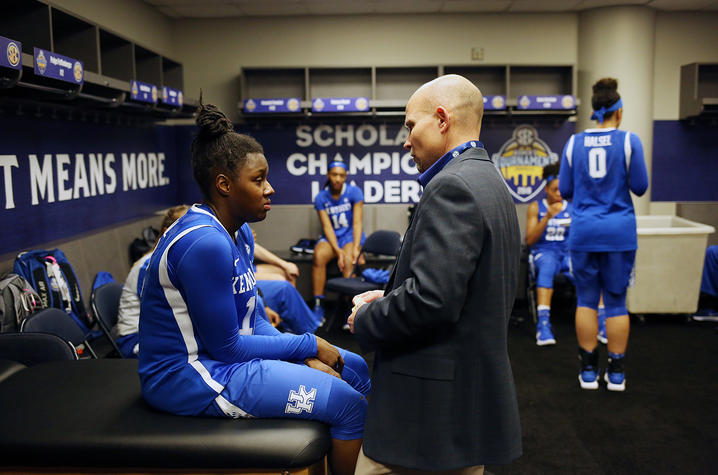By Olivia Ramirez

Photo Courtesy of UK Athletics | Dr. Robert Hosey with a student athlete.
When an athlete takes a hard hit or fall, one of the first things that comes to the minds of coaches, athletic trainers, team physicians and spectators is the risk of concussion. Protocols are in place to assess if an athlete has sustained a concussion or if they can be cleared to go back into the game. However, there is some ambiguity between physicians as to what constitutes a concussion.
That's why over the next three years and with a nearly $1 million grant from the National Institute of Neurological Disorders and Stroke, researchers at the University of Kentucky are studying whether a rapid blood test could serve as another means of support in diagnosing concussion.
Mark Lovell, the Jack and Linda Gill professor of Chemistry and faculty in the UK Sanders-Brown Center on Aging and principal investigator (PI) of the study, working with Dr. Melissa Bradley-Whitman and Dr. Bert Lynn, developed a device that will be used to test whether blood levels of a neuron specific protein show a change if an athlete sustains a concussion. The test being studied at UK is done with a drop of blood and can provide results in 20 minutes, whereas most current concussion blood tests being studied require more blood be drawn, can show changes with physical activity and can take longer periods of time to show results.
Current concussion diagnosis is made through a purely clinical evaluation by a clinician experienced in concussion evaluation through patient history and physical exam which includes a survey of symptoms, a neurocognitive exam conducted by a clinician. For a college or professional athlete this testing is often done by a team physician or athletic trainer, but for younger athletes or athletes in programs that don't have access to a clinician of this type, this may be done by a coach or later by a primary care provider. Because diagnosing a concussion requires clinical expertise, physicians from the UK Department of Orthpaedic Surgery and Sports Medicine are part of the research team.
Dr. M. Kyle Smoot, an associate professor of orthopaedic surgery and sports medicine and family medicine, serves as the medical PI for the study and along with Dr. Kim Kaiser and Dr. Robert Hosey, developed the clinical research design of the study and will use the device created by the Lovell lab to study student-athlete volunteers from various sports at UK and Eastern Kentucky University. The results will remain blinded; the physician conducting the blood test will not see the results, a graduate student will read and record the outcome.
When Lovell and Smoot approached UK Athletics about participating in the project they quickly saw the potential to change the way medicine was practiced in a positive way.
“Sport-related concussion is a condition of great interest to the athletes and the athletics community nationally and internationally,” UK Athletics Director of Sports Medicine Jim Madaleno said. “UK Athletics welcomes this opportunity to contribute to the advancement of science in this area.”
“Housing an academic campus, medical center and athletics department on a single campus makes this kind of research possible,” Smoot said. "This environment makes collaboration exciting as we are able to leverage our experience and expertise to easily bring great ideas and tools from the lab to the clinical setting. We are able to develop and build a device and perform the study all on one campus."
Lovell continued saying, "You can build the ideal device but if you can't test it on the subjects its intended for it's not useful."
UK is the University for Kentucky. At UK, we are educating more students, treating more patients with complex illnesses and conducting more research and service than at any time in our 150-year history. To read more about the UK story and how you can support continued investment in your university and the Commonwealth, go to: uky.edu/uk4ky. #uk4ky #seeblue
